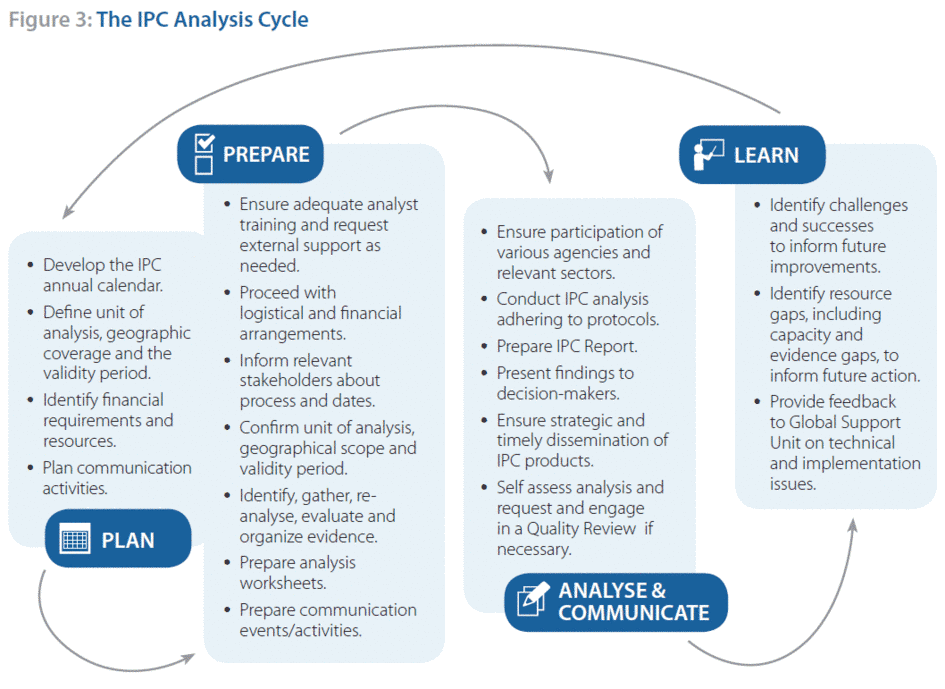1.10 The IPC Analysis Cycle
The IPC Analysis Cycle includes four inter-linked stages that need to be followed for each IPC analysis in order to produce high-quality products and effectively communicate results (Figure 3). An analysis cycle, excluding planning and lessons learning, usually takes between one and three months, although Chronic Food Insecurity classifications may take longer, depending on the analysis coverage and other parameters.
- Plan: Technical Working Groups should develop annual calendars, taking into account seasonal considerations and decision-makers’ needs. Since IPC Acute Classifications are based on recent data, the calendar should foresee that IPC analyses are preceded by data collection. At this stage, the Technical Working Group should define the unit of analysis, geographic coverage and validity period for each planned analysis. Together with the calendar, financial requirements and resources for IPC implementation should be identified. At this stage, a communication plan should be developed to ensure that IPC findings are timely and efficiently communicated. For Acute classifications, annual planning should be directly linked to the Humanitarian Programme Cycle – including the development of the Humanitarian Needs Overview/Humanitarian Response Plan – when the cluster system is operational. The Technical Working Group should thus plan IPC activities in close collaboration with both the Food Security and Nutrition Clusters when present. IPC planning should be flexible enough to allow IPC acute analyses to be carried out in response to unforeseen events (e.g. sudden onset crisis).
- Prepare: Preparation includes activities to ensure that analysts are adequately trained and that requests for external technical support, including communication support, are secured as needed. At this stage, the Technical Working Group should proceed with logistical and financial arrangements, and ensure that relevant stakeholders are informed about the analysis process and dates. During preparation, the Technical Working Group should confirm the unit of analysis and geographic scope foreseen in the planning stage as well as identify, gather and re-analyse evidence as needed and feasible. During this process, analysts should ensure that minimum evidence requirements are met. At this stage, all evidence should also be evaluated against the reliability criteria, and organized and included in the analysis worksheets. Preparations should also extend to communication activities, such as preparing dissemination events. Preparation can take from one week to a few months depending on the scale used and the amount of data re-analysis needed.
- Analyse and communicate: At the core of IPC analysis is the workshop, where the Technical Working Group convenes analysts from relevant agencies and sectors to undertake the convergence of evidence following the IPC protocols, agree on classification and population estimates, draft the IPC Analysis Report, conduct a self-assessment and request a Quality Review if needed. Once the analysis has been completed, the Technical Working Group is encouraged to hold a meeting with decision-makers to present and discuss the findings. Subsequently, IPC communication products are prepared and strategically disseminated as soon as possible after completion of the IPC analysis. The analysis process typically includes a week-long analysis workshop, which can be followed by other supporting activities.
- Learn: Learning ensures constant self-improvement by informing action needed before the next analysis. Technical Working Group members are required to reflect on challenges encountered, such as inadequate evidence, unsuitable timing of analysis, and resource and capacity gaps, and are encouraged to develop a plan to address them. Furthermore, lessons learned from the country analysis are also fed back to the Global Support Unit for the development and review of technical guidance and training materials, as well as adjustments in global coordination and country support.
